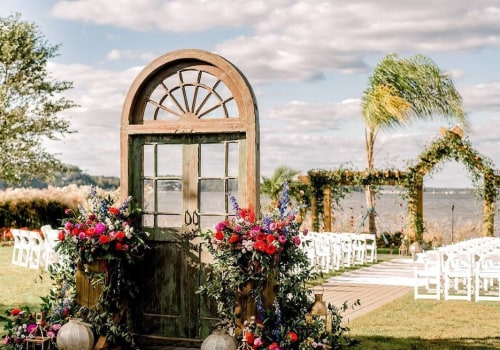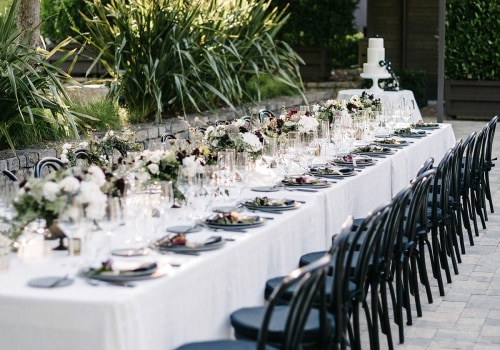Creating a successful wedding timeline is essential to ensure that your big day goes as smoothly and stress-free as possible. It's important to plan ahead and consider all aspects of the day, from the ceremony to the reception. With the right timeline, you can make sure every detail is taken care of and your guests will have an amazing time. In this article, we'll provide some useful tips to help you create a successful wedding timeline that will make your special day even more special.
Set Your Budget
: Creating a successful wedding timeline starts with setting a budget.The budget should be realistic and include all the necessary components of the wedding, from the venue and caterer to the photographer and florist. A good way to stay on budget is to assign a certain percentage to each element of the wedding. This will help keep costs in check and ensure that you are able to plan a wedding that fits within your budget. Be sure to include any unexpected expenses that may come up, such as travel and lodging for guests.
Establish Your Timeline
: Once you have your budget set, you can begin to establish your timeline.Start by deciding on the date of the wedding and then plan backward from that date. Make sure to factor in holidays, school breaks, and other special occasions so that you do not end up with a conflict. Then determine how long it will take you to complete each task for the wedding. Give yourself plenty of time for tasks that require more effort or are more complicated, such as vendor selection and ordering invitations.
Select Your Venue
: Selecting the venue for your wedding should be one of the first steps in creating your timeline.Make sure to research different locations and compare pricing and availability. Also consider how much space you need, what type of setting you want, and what amenities are available at each location. Once you have selected your venue, make sure to confirm all the details such as time restrictions, payment requirements, and any other restrictions that may apply.
Choose Your Vendors
: Choosing vendors for your wedding is an important part of the timeline. Start by researching different vendors in your area and compare their services and prices.Make sure to read reviews and ask for references so that you can feel confident in your decision. Also consider if the vendor offers any packages or discounts that may be of benefit. Once you have selected your vendors, be sure to confirm all the details such as delivery dates, payment requirements, and any other restrictions that may apply.
Make Lists and Track Your Progress
: To ensure that you stay on track with your timeline, create lists of tasks that need to be completed for each element of the wedding. For example, create a list of vendors that need to be contacted for quotes, deposits that need to be made, invitations that need to be ordered, etc.As you complete each task, mark it off your list so you can easily keep track of what needs to be done next.
Give Yourself Plenty of Time
: When creating a timeline for your wedding, make sure to give yourself plenty of time for each task. This will allow you enough time to adequately research vendors, make decisions, handle any unexpected issues that may arise, and make sure everything is in order for the big day. It's also important to leave some wiggle room in case something unexpected comes up or something falls through.Have Backup Plans in Place
: No matter how carefully you plan your timeline, there is always a chance something unexpected could occur. To ensure your wedding goes off without a hitch, it's important to have backup plans in place.Consider having a list of alternate vendors or venues in case something falls through or becomes unavailable at the last minute. You should also plan for any possible weather changes or other unexpected events so that you are prepared for any situation.
Have Backup Plans in Place
When creating a wedding timeline, it is important to have backup plans in place. This is especially true when dealing with unforeseen circumstances, such as inclement weather, changes in venue availability, or any other unexpected event. Having a backup plan in place ensures that you are prepared for any eventuality, and can ensure that your special day goes off without a hitch.When creating a backup plan, it is important to be flexible and open-minded. Consider options such as having an alternate ceremony or reception location available, or having an alternate date available in case of an emergency. It is also important to make sure that all vendors and guests are aware of the potential need for a backup plan. It is also important to consider the logistics of any backup plans.
Make sure to have all necessary supplies and materials ready for any eventuality, and be prepared to adjust your timeline as needed. Have contingency plans in place for any delays or changes in schedule, and make sure to keep all vendors informed of any changes to the timeline. Having backup plans in place is an essential part of creating a successful wedding timeline. By being prepared for any eventuality, you can ensure that your special day goes off without a hitch.
Make Lists and Track Your Progress
Making lists and tracking your progress is essential for creating a successful wedding timeline. It helps you to stay organized and can help you manage the many tasks that need to be completed.Lists can help you prioritize tasks, assign them to people, and keep track of the progress of each task. Tracking your progress also allows you to identify potential problems early on and make adjustments as needed. When making your lists, it’s important to be as detailed as possible. Include all the tasks that need to be completed, from budgeting to scheduling to vendor selection. Make sure to also include deadlines for each task, as this will help you stay on track.
Additionally, make sure to add notes or reminders for each task, as this can help when it comes time to review them. Tracking your progress is also important. Keeping track of which tasks have been completed, which tasks are still pending, and any changes that have been made can help ensure you don’t miss anything. Additionally, tracking your progress can help you stay motivated by giving you a sense of accomplishment and helping you to stay focused on your goals. Creating a successful wedding timeline requires planning and organization. Making lists and tracking your progress can help ensure that everything goes according to plan and that your special day is everything you dreamed it would be.
Choose Your Vendors
Choosing the right vendors is an essential part of creating a successful wedding timeline.Not only do you need to find vendors who are experienced in the services you require, but you also need to make sure they have the availability to work on your special day. To ensure you have the best possible vendors for your wedding timeline, it's important to do your research and ask the right questions. When looking for vendors, it's important to find out their experience in the field and any certifications or awards they may have. It's also a good idea to ask them about their availability and scheduling policies.
You'll want to make sure they can accommodate your timeline and be available when you need them. Additionally, it's important to ask about their payment policies and check references from former clients. Finding vendors who are reliable and trustworthy is key to creating a successful wedding timeline. Once you have narrowed down your list of potential vendors, it's important to set up meetings with them and get a feel for how well they can work with you. Ultimately, you should choose the vendor who will best fit your needs and help make your special day a success.
Set Your Budget
Creating a wedding timeline is essential for ensuring your special day runs smoothly.Before you can start mapping out your timeline, you need to set a budget. Budgeting is an important part of any wedding planning process, and setting a budget will help keep you on track and help avoid any potential financial issues. When setting your budget, it’s important to plan for unexpected costs such as travel expenses, vendor fees, and any other miscellaneous costs that may arise. You should also factor in taxes, tips, and gratuities.
It’s wise to set aside an additional 10-20% of your total budget for these unforeseen expenses. Additionally, consider allocating a certain percentage of your budget towards each wedding element. For example, you may decide to spend 20% of your budget on photography, 10% on catering, and so on. When budgeting for your wedding, it’s important to be realistic and honest with yourself about how much you can afford.
Don’t be tempted to overspend on certain items in order to make them “perfect” – it’s better to be prepared for any potential issues than to be left with a hefty bill at the end of the day. Finally, don’t forget to factor in the cost of the wedding dress and any other attire that may be needed. Be sure to include any accessories such as jewelry or shoes as well. Once you’ve set your budget, it will be easier to plan out the rest of your wedding timeline.
Establish Your Timeline
Having an established timeline is essential for creating a successful wedding timeline. It ensures that all of the components of your wedding are planned and coordinated, and will help ensure your special day goes off without a hitch. Here are some tips for creating an effective timeline for your wedding:Set realistic goals and deadlinesWhen it comes to planning a wedding, it’s important to set realistic goals and deadlines. Give yourself enough time to plan and coordinate all of the details of your wedding, while also allowing yourself room to make adjustments if necessary.It’s important to have an overall timeline in mind when it comes to making decisions, so you can be sure that everything is running smoothly.
Plan ahead for any potential problems
When creating your timeline, it’s important to plan ahead for any potential problems that may arise. This will help you stay on track and avoid last-minute surprises. Make sure to factor in any potential problems into your timeline, so you can be prepared if something goes wrong.Communicate with your vendors
It’s important to communicate with all of your vendors throughout the planning process. Make sure to keep them informed of any changes or updates to your timeline, so they can be prepared to meet any deadlines or make any necessary adjustments.Be flexible with your timeline
No matter how much you plan, things may not always go according to plan.It’s important to be flexible with your timeline, so you can make adjustments if necessary. This will help ensure that everything runs smoothly and that you don’t feel overwhelmed by the planning process.
Give Yourself Plenty of Time
When it comes to creating a successful wedding timeline, it's essential to give yourself plenty of time. Planning a wedding is no small feat, and it can take months to coordinate all the elements. It's important to plan ahead and give yourself enough time to make sure everything goes smoothly.Here are some tips for giving yourself enough time when creating a wedding timeline:Start EarlyThe sooner you start planning, the better off you'll be. Start looking into venues, vendors, and other resources as early as possible. This will give you plenty of time to research your options and make the best decisions for your wedding. It also gives you the opportunity to book the best vendors and venues before they get booked up.
Set Deadlines
Setting deadlines for each task can help you stay on track and ensure that everything is done in time for your wedding.Start by setting an overall timeline for the entire planning process, then break it down into smaller, more manageable chunks. Make sure to set realistic deadlines for each task so that you're not rushing or becoming overwhelmed.
Allow Room for Flexibility
No matter how well you plan, there may be unexpected hiccups along the way. Allow yourself some room for flexibility in your timeline so that you can adjust as needed. This will help ensure that any last-minute changes don't throw off your entire plan.Seek Help
If you're feeling overwhelmed or running out of time, don't hesitate to seek help.Ask friends and family members to lend a hand with planning tasks, or hire a wedding planner to take care of the details for you. This will take some of the pressure off of you and help ensure that everything is done in time.
Select Your Venue
Choosing the right venue for your wedding is essential for creating a successful timeline. It sets the tone and atmosphere for your special day, and it also helps to provide structure for the rest of your planning. Some important factors to consider when selecting your venue include:LocationThe location of your venue will determine how easily your guests will be able to access it.For example, if you’re having a destination wedding, you’ll want to make sure it’s easy for your guests to get to. Additionally, consider whether or not the venue is near any attractions or activities that your guests can enjoy before or after the wedding.
Size and Capacity
You’ll need to make sure that the venue you choose can accommodate the size of your guest list. Additionally, consider whether you’ll need extra space for a dance floor, seating, tables, etc. Make sure you have a clear understanding of the size of the venue and its capacity.Amenities
It’s important to consider what amenities are available at the venue.Are there enough bathrooms? Is there a kitchen? Is there enough parking? Does the venue provide tables, chairs, and other necessary items? Make sure that you have all of these questions answered before selecting your venue.
Cost
Finally, make sure you have a clear understanding of the cost associated with the venue. What is included in the cost? What is not included? Are there any additional fees? Make sure you have a full understanding of the cost before selecting a venue. Selecting the right venue for your wedding can help ensure that your timeline is successful. Take into account all of the important factors mentioned here and make sure you have a clear understanding of all costs before making your selection. Creating a successful wedding timeline takes dedication, organization, and careful planning. Set your budget, establish your timeline, select your venue, choose your vendors, make lists and track your progress, give yourself plenty of time, and have backup plans in place.Consider these tips when preparing your own timeline, as they can help ensure your special day runs smoothly from start to finish.












Leave Reply